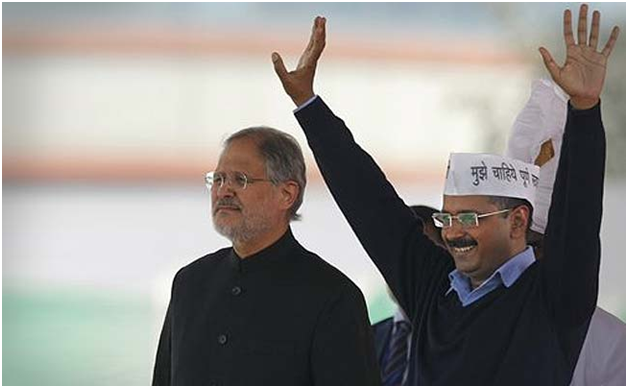Who is In Charge of Delhi?

After the High Court verdict on the constitutional status of Delhi, every perceptive Delhiite must have realised how have they been short changed in the name of statehood.
In essence the High Court has validated through its literal interpretation of legal provisions the fragile edifice of Delhi’s statehood. It is a functioning state as long as it is being ruled by the centrist political class (BJP or Congress). If some political formation antithetical to the interests of this centrist political class is voted into power, then the first house keeping rule is to put Anti Corruption Bureau(ACB) out of its purview and take the custody of the “cupboard” for safekeeping, create all sorts of operational precarities so that the new ruling party is embroiled in a procedural quagmire. Friendly media elite in tandem, will craft an image of a cantankerous politician who prefers fights over functioning.
This is what the Modi Government at the center has been doing since the early days of the Aam Aadmi Party in power in Delhi. All that the High Court has done is elucidate its constitutional basis. Delhi is not a state to have a sovereign legislature, it is a Union Territory. Here, popular mandate is subservient and can be emasculated any time by the sweet will of an officer appointed by president on advice of Ministry of Home Affairs. With this one judgment Delhiite have lost part of their democratic rights and become secondary citizens akin to life under British colonial masters from whom this concept of Union Territory has been borrowed.
The genesis of the entity of Union Territory dates back to 19th century British India called then as part C & part D states which were essentially bureaucratic and autocratic enclaves where no general laws was applied except few as applicable by notification under the assumption that the simple tribal population living on these lands needed simple laws. As per scheduled district law of 1874, The title of head of such districts as Lieutenant Governor has its origin in British administrative terminology of a level below the Governor who headed a province then.
This entity of Union Territory has been vehemently opposed several times starting with constituent assembly of Independent India where this provision was severely criticised by Desh Bandhu Gupta of Delhi. To quote his words “this provision (draft articles 212 to 214) would only perpetuate existing state of affairs (as before independence) by denying people a hand in administrative set up and preventing establishment of responsible Government”. Unfortunately, rather meaningful as clearly evident today, this criticism was completely ignored in the draft finally adopted.
Second time was when the Union Territories Act of 1963 was tabled in Parliament. The Act was severely criticised on the grounds that if an administrator is imposed on the people, the council of ministers will become a mere rubber stamp. The wide powers to the executive will result in perpetual conflict between the executive and legislature and will create room for perpetual central intervention. It will eventually result in limiting the autonomy of the legislature and constant friction between the legislature and executive, as well as legislature and center.
Delhiites must realize that their real democratic rights are limited to Municipal Corporation of Delhi. Unlike an average citizen of any other state who can hope to get his/her aspirations fulfilled by party they have elected to run their affairs, Delhi is subject to the autocratic regime of a LG. Their democratic life in the areas of state subjects is no longer the business of the party they chose with a magnificent majority of 67 seats out of 70. Instead, it will always be a subject of bitter dispute between their legislature and Lieutenant Governor, a HMO/PMO operative. In the end if the LG prevails the so called fine balance between executive and legislature would have gone for a toss.
It may be pertinent to note at this juncture, the oversimplified narrative promoted by the Indian media as an unprovoked brawl by a prickly politician who enjoys a daily dose of fight with a composed, level headed and fair minded Lieutenant Governor. Najeeb Jung, the current Lieutenant Governor of Delhi is no astute statesman but a pliable former career IAS officer skilled at being proximate to the ruling class of the day. Once a late Madhavrao Scindia confidante, he is now with the BJP at the centre. He was a joint secretary (exploration) in the ministry of petroleum and natural gas when the controversial Panna-Mukta oil fields originally discovered by ONGC was needlessly handed over to private sector for pittance. Then, he quit the civil services and went on to work with one of the same private company from the same consortium. He has also worked as director (energy research) with the Reliance India-funded Observer Research Foundation, having worked in London earlier with Reliance Global Management Services.
So let us stop targeting Kejriwal whose clean and meritorious civil service record and morally incorruptible character is beyond doubt. He is the braveheart who has among several things, shown the limitations of Delhi’s statehood. For this one action alone, he will earn many supporters.
Shrinivas Dharmadhikari is a Global Marketing & Public Policy Consultant with 25 years of experience in regions like Africa (East & West) South East Asia and Europe. He is also a member of the Harvard Business Review Advisory Council.



